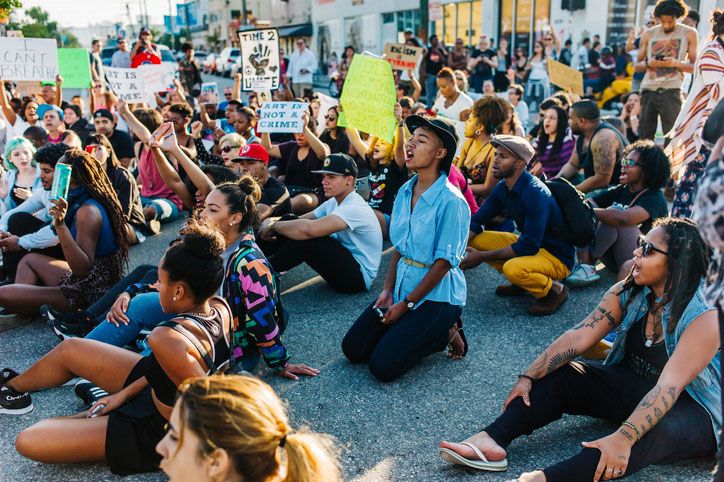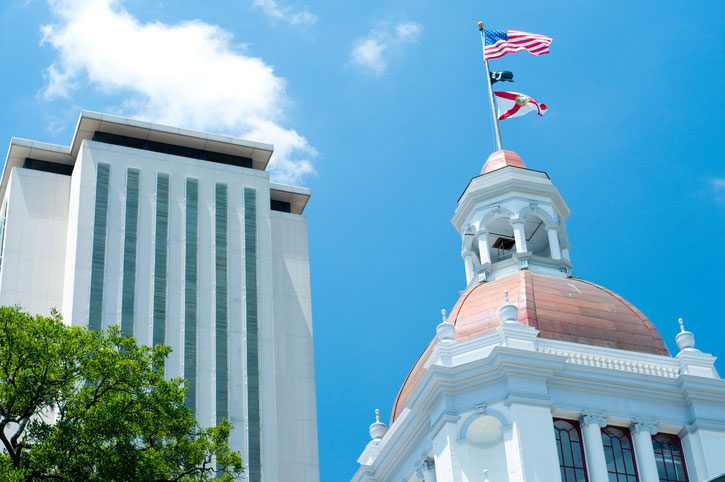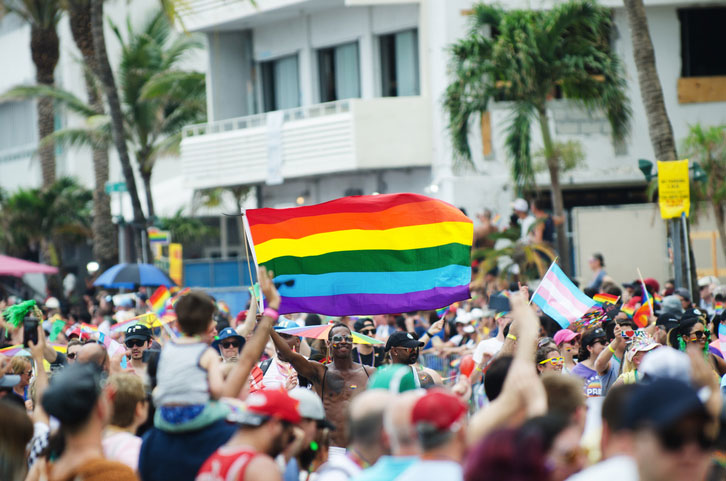Written by Sam Medley

For every individual a social worker helps, there’s almost always a systemic issue tied to that person’s struggles. A law that keeps them from getting the help they need. A policy that relegates them to second-class citizenship. Or a widely held cultural attitude that can turn the smallest day-to-day interaction into a situation fraught with real danger.
To some, that may sound like a description of a different time. But for many in Florida, it’s reality here and now.
The Pulse Nightclub shooting of 2016 left 48 dead, 58 injured, and countless more terrified. This act of hate against the LGBTQ+ community ranks as one of the deadliest terror attacks on American soil.
And while other people were nursing hangovers or enjoying a day off from work on New Year’s Day 2023, a 28-year-old farmworker from Mexico (with the proper work permits) died on-the-job in Parkland. An OSHA investigation found that this tragedy could have been prevented if his employers had taken the proper precautions against the sweltering heat. In the migrant worker community, this type of story is all too common.
Unfortunately, these two incidents aren’t isolated. They’re indicative of the kind of culturally entrenched prejudice that even Florida’s schools, businesses, and government institutions aren’t immune from. Social workers are instrumental to reversing the progression of this all-consuming illness — no matter what form it takes.
How Florida’s Social Workers Bring About Systemic Change
Every type of social worker in Florida has the power to champion social justice. Case managers can connect marginalized people to the services they need to survive and thrive. Clinical social workers can educate and empower their clients as they provide counseling. And social service administrators can create policies and organize programs that bring otherwise hard-to-access services to the communities that need them most.
Despite ongoing inequities in Florida, there are plenty of organizations that carry out these essential community-building functions.
For example, in Miami, there’s the Equity and Advocacy Collective. This coalition of Black-led, community-based organizations provides financial, educational, behavioral health, and food security services to about 200,000 individuals and households every year. And in rural communities across the state, the Farmworker Association of Florida runs programs focused on environmental justice, migrant worker rights, and much, much more.
Becoming a Social Justice Specialist in Florida with a Specialized MSW or BSW
While any type of social worker can be a powerful force for equity, earning a BSW or MSW degree with a focus in social justice will offer a unique level of expertise. And fortunately, Florida is home to CSWE-accredited programs that deliver exactly that kind of expertise.
Mezzo-level social work takes on bigger picture issues at the community level, while macro-level social work takes it a step further, working at the legislative level to effect system change. In these roles, social workers bring leadership skills and a deep commitment to social progress in a push for high-level change that can lead to more legal protections for historically marginalized groups and more funding for programs that benefit them.

However, you’re not likely to find job postings specifically for mezzo-and macro-level social workers in Florida. Instead, you’ll find opportunities under titles like service administrator, policy analyst, or community advocacy specialist. In the world of social justice, these professionals:
- Investigate systemic issues like healthcare access, crime, or poverty while paying close attention to how these problems affect marginalized groups
- Bring local leaders and organizations (churches, charities, libraries, healthcare providers, etc.) together to provide services to the community
- Help local organizations get the funding and other resources they need to maintain a strong support system
- Run community education and outreach campaigns
- Petition local, state, and federal legislators for systemic change while gaining support from the public
You’ll find CSWE-accredited BSW and MSW programs right here in Florida that are aimed at preparing social workers for exactly this kind of work.
Florida State University in Tallahassee with an additional location in Panama City, offers a BSW with a focus in Advocacy and Social Justice and an MSW in Social Leadership. In addition to learning about the ins-and-outs of managing a social service organization, you can also take classes on legislative advocacy, engaging diverse communities, and policy analysis.
In Tallahassee, Florida A&M University’s macro-focused MSW curriculum features classes on organizational resource management and community development, plus electives on women’s issues and rural social work.
If you want to explore more options, there’s a whole world of online MSW programs that offer degree specialties in areas like community organization, advocacy, and social justice.
Dual Degree Programs: Helping Students Bring Social Justice Principles to Other Fields
As the old saying goes, change comes from within. But that’s not just true on a personal level. It can apply to systemic change, as well. Whether you compelled to be a voice for progress in the justice system, healthcare, or government, you might want to consider pairing your MSW with a graduate degree in another discipline.
However, you won’t have to figure out the logistics of that on your own. Many of Florida’s schools of social work offer dual degree programs that let you earn an MSW and a second master’s degree in just three total years, potentially less if you hold a BSW and qualify to enroll in an Advanced Standing MSW program.
Through a dual degree program, you can earn an MSW alongside advanced degrees in public health, criminal justice, public administration, and business administration:
- Master of Public Health (MPH). The MSW/MPH combination is a great option if you want to help private healthcare organizations run community-based clinics or assess community health needs while working for the Florida Health Department or a county department.
- Degree in Law or Criminal Justice. Making the criminal justice system more just means knowing how to navigate it. With a dual degree in social work and criminal justice or law, you can work for any number of local, state, or federal courts, law offices, or nonprofit watchdogs that stand up for civil and human rights.
- Master of Public Administration (MPA). With an MPA and an MSW, you can help government and nonprofit agencies alike design and implement programs that help vulnerable communities. You can also use your administrative talents to help small and grassroots organizations sustain themselves.
- Master of Business Administration (MBA). The private sector can be a powerful ally in the fight for widespread, meaningful change. With an MSW and an MBA, you can help hospitals, major local employers, and other organizations become stewards of their communities. It can also be a great combination if you want to work in one of Florida’s many privately-run social service providers.
The University of South Florida’s Sarasota campus and Florida International University in Miami both offer MSW/MPH programs. At Florida State University you can pair your MSW with an MBA, MPA, Master’s in Criminal Justice, or Juris Doctor (law degree).
Professional Certifications that Can Help Tailor Your Skillset to Social Justice and Advocacy
Offered through the Florida Board of Clinical Social Work, Marriage & Family Therapy and Mental Health Counseling, the Certified Master Social Worker (CMSW) is the one state-level community and administration-focused credential open to Florida social workers. It’s a natural stop for any nonclinical social worker with advanced expertise. Qualifying for the credential requires:
- An MSW with classes on topics that include human services advocacy and community organization
- Three years of documented experience, two of which must be completed after you earn your MSW
- Passing scores on the Association of Social Work Board’s Advanced Generalist exam
As a state government-issued credential, it can carry a lot of weight when looking for jobs with Florida state agencies.
National Association of Social Workers Certifications
If you want to display your talents in working with specific populations or doing a specific kind of social work, the National Association of Social Workers (NASW) offers an impressive range of certifications. And because the NASW is the country’s biggest and arguably most influential social work organization, their certifications are widely recognized and respected.
Through the NASW, you can get certified in:
- Gerontology.
- Child welfare.
- Advanced clinical practice.
- Healthcare social work.
- Military social work.
- Case management
- Substance use disorders.
Exact requirements vary, but with an MSW, two years of relevant experience, and 20 hours of relevant continuing education.
Florida’s Social Workers Bring Talent and Dedication to Social Justice Advocacy Jobs

With an MSW and perhaps a certification or two, you’ll have plenty of nonprofit and government agencies eager to bring you board. During the fieldwork portion of your degree program (at either the BSW or MSW level), you’ll get an introduction to a few of them and a chance to experience for yourself how the work gets done.
In the government sector, working with the Department of Children and Families’ Refugee Services Program and their community-based partners is a great way to make Florida feel like home for everyone. Or if you want to help legislators craft person-first laws, you can work for the Office of Program Policy Analysis and Government Accountability as a policy analyst.
Florida’s large and impressively diverse nonprofit sector might be the best place to start. No matter what your calling is, there’s likely an organization out there that needs your talents.
For instance, if you’re passionate about ensuring the LGBTQ+ community is afforded the same rights as everyone else, check out Equality Florida. They’re involved in everything from legislative advocacy to supporting students in schools that deny them the freedom to express their gender identities.
In the ongoing battle for immigrant rights, there’s perhaps no bigger champion in the state than the Florida Immigration Center. While they help individuals with deportation hearings, educational benefits, and a slew of other issues, they also help immigrant communities build their own support networks and run public education campaigns.
These are only a few of the Florida-based organizations dedicated to social justice causes. For more ways to make advocacy your life’s work, look into the many other organizations that make up Florida’s network of social justice advocacy groups.
